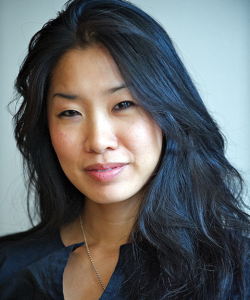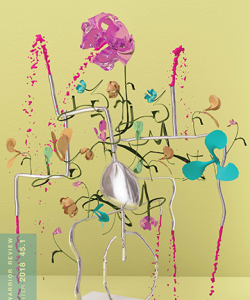Ten Questions for Jana Prikryl

“Crucial to writing the book was the panic I started feeling about halfway through.” —Jana Prikryl, author of No Matter
Jump to navigation Skip to content

“Crucial to writing the book was the panic I started feeling about halfway through.” —Jana Prikryl, author of No Matter
“I don’t know exactly what a prayer is. I do know how to pay attention, how to fall down into the grass, how to kneel down in the grass, how to be idle and blessed...” In this animated video, the late Mary Oliver reads her poem “The Summer Day” recorded from a 2012 92Y reading.

The poet laureate of Brooklyn, New York, on writing hybrid forms, a life in the arts, and the racial tension at the heart of her new book, Hybrida.
July’s final deadlines include several awards with purses of $1,000 or more for individual poems, short stories, and essays. Or, if you’ve been busy this summer and have a collection ready for submission, consider three contests for short story and essay manuscripts.
F(r)iction Short Story Contest: A prize of $1,000 is given three times a year for a short story. Entry fee: $15. Deadline: July 31.
Hidden River Arts Hawk Mountain Short Story Collection Award: A prize of $1,000 and publication by Hidden River Press is given annually for a story collection. Entry fee: $22. Deadline: July 30.
Munster Literature Centre Seán Ó Faoláin Short Story Competition: A prize of €2,000 (approximately $2,250) and publication in Southword is given annually for a short story. The winner also receives a weeklong residency at the Anam Cara Writer’s Retreat on the Beara Peninsula in West Cork. Entry fee: €18. Deadline: July 31.
Narrative Spring Story Contest: A prize of $2,500 and publication in Narrative is given annually for a short story, a short short story, an essay, or an excerpt from a work of fiction or creative nonfiction. A second-place prize of $1,000 is also awarded. The editors will judge. Entry fee: $27. Deadline: July 31.
New Millennium Writings New Millennium Awards: Four prizes of $1,000 each and publication in New Millennium Writings and on the journal's website are given twice yearly for a poem, a short story, a short short story, and an essay that have not appeared in a print publication with a circulation over 5,000. Entry fee: $20. Deadline: July 31.
Seneca Review Books Deborah Tall Lyric Essay Book Prize: A prize of $2,000 and publication by Seneca Review Books will be given biennially for a collection of lyric essays. Jenny Boully will judge. Cross-genre, hybrid, and verse forms, as well as image and text works, are also eligible. Entry fee: $27. Deadline: August 1.
Sewanee Review Poetry and Fiction Contest: Two prizes of $1,000 each and publication in Sewanee Review will be given annually for a group of poems and a short story. Carl Phillips will judge in poetry and Roxane Gay will judge in fiction. Entry fee: $30. Deadline: July 31.
University of Notre Dame Sullivan Prize in Short Fiction: A prize of $1,000 and publication by the University of Notre Dame Press is given biennially for a story collection. Writers who have published at least one story collection are eligible. Entry fee: $15. Deadline: July 31.
Visit the contest websites for complete guidelines, and check out the Grants & Awards database and Submission Calendar for more contests in poetry, fiction, and creative nonfiction.

The winners of the 2019 Literary Magazines Prizes are the Common, American Short Fiction, Margins, the Black Warrior Review, and the Offing.
“Most of life is ordinary...ordinary isn’t the enemy but instead something nourishing and unavoidable, the bedrock upon which the rest of experience ebbs and flows,” writes Mike Powell in a recent New York Times essay about embracing the process of washing dishes as a ritual practice in patience. Write a poem that considers a household chore in a new light. Is there anything extraordinary about the ordinariness of an everyday activity such as your job commute, making your bed, taking out the trash, brushing your teeth, washing dishes, or pumping gas into your car? How can these tasks be viewed as a nourishing element of your life?
Just a few days left to submit to the following writing contests, all with a deadline of July 14 or July 15. Each contest offers a first-place prize of at least $1,000 and publication. Good luck!
Cincinnati Review Robert and Adele Schiff Awards in Poetry and Prose: Two prizes of $1,000 each and publication in Cincinnati Review are given annually for a poem and a piece of fiction or creative nonfiction. Rebecca Lindenberg will judge in poetry and Michael Griffith will judge in prose. Entry fee: $20. Deadline: July 15.
Comstock Review Muriel Craft Bailey Award: A prize of $1,000 and publication in Comstock Review is given annually for a single poem. David Kirby will judge. Entry fee: $28. Deadline: July 15.
Literal Latté Poetry Award: A prize of $1,000 and publication in Literal Latté is given annually for a poem or group of poems. Entry fee: $10. Deadline: July 15.
Los Angeles Review Literary Awards: Four prizes of $1,000 each and publication in Los Angeles Review are given annually for a poem, a short story, a short short story, and an essay. Matty Layne Glasgow will judge in poetry, Tammy Lynne Stoner will judge in fiction, Brittany Ackerman will judge in flash fiction, and Adrianne Kalfopoulou will judge in nonfiction. Entry fee: $20. Deadline: July 14.
Narrative Poetry Contest: A prize of $1,500 and publication in Narrative is given annually for a poem or group of poems. The poetry editors will judge. Entry fee: $25. Deadline: July 14.
Rattle Poetry Prize: A prize of $10,000 and publication in Rattle is given annually for a poem. A Reader’s Choice Award of $2,000 is also given to one of ten finalists. Entry fee: $25. Deadline: July 15.
Santa Fe Writers Project Book Award: A prize of $1,500 and publication by the Santa Fe Writers Project is given biennially for a book of fiction or creative nonfiction. Carmen Maria Machado will judge. Entry fee: $30. Deadline: July 15.
The Word Works Tenth Gate Prize: A prize of $1,000 and publication by the Word Works is given annually for a poetry collection by a poet who has published at least two full-length books of poetry. Entry fee: $25. Deadline: July 15.
Visit the contest websites for complete guidelines, and check out the Grants & Awards database and Submission Calendar for more contests in poetry, fiction, and creative nonfiction.
“From the window I watched older men push carts between stopped cars...” In this video Alfredo Aguilar, one of the winners of 92Y’s 2019 Discovery Poetry Contest, reads his poem “My Mother Drove Us Into Tijuana for Dentistry.”
“Back home we are plagued by a politeness / so dense even the doctors cannot call things / what they are…” Safia Elhillo narrates her poem “To Make Use of Water” from her collection, The January Children (University of Nebraska Press, 2017), for this animated TED-Ed film directed by Jérémie Balais and Jeffig Le Bars.
“Language is a living being. I think that language came before humans, not the other way around…. It might not have been a particularly logical language; more likely, it was paradisiacal and timeless, a kind of happy babbling for the sake of babbling, a kind of music.” In her essay “Language and Madness,” translated from the Swedish by Johannes Göransson and Joyelle McSweeney and posted on the Poetry Foundation’s Harriet blog, Aase Berg writes about the influence of power and patriarchy on language and describes an evolution by which language has become self-conscious and utilitarian, “more descriptive instead of creative.” How has your own language output—in both everyday and poetic usage—been tamed? Write a poem that plays with the idea of timeless, illogical language. What does happy babbling look or sound like? What expressive potential can you tap into to write with childish madness about the banalities of private life?